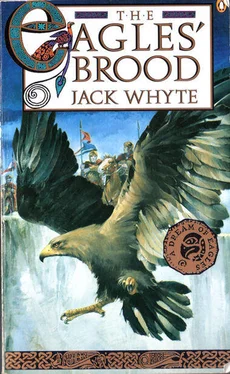Throughout the remainder of that morning, I became inured to the sight of my own men lying dead. They had taken many of the enemy with them, but I ignored those completely, my eyes attracted only to the colours of Camulod and the red dragon of Pendragon. My route lay directly to the south, to the sea, and I knew I would wade through the debris of a running fight for the entire journey. I met five living men of Uther's force, all wounded badly; none able to tell me anything coherent. I left each of them with food and drink and moved on. I also found eight of Lot's men alive, five of them dying. The other three tried to unhorse me all at once, but I had seen the one crouched in the tree above me and was forewarned. I killed him as he leaped at me, catching him on my sword point and thrusting him away and down so that he almost tore the weapon from my grasp. One of the others seized me by the ankle, but my horse turned on him, striking him with its shoulder, and he fell away as I slashed at him, catching him high on the side of the head. The third man fled and I did not have the heart to follow him.
I stopped to eat and change horses at noon in an open meadow that seemed miraculously free of corpses and signs of conflict, and less than half an hour after that I came across a scene that harrowed me far more than the carnage of battle through which I had been riding all morning.
I emerged from a small valley between two low, swelling hills to find myself in a devastated farmstead. The farmhouse itself had been no more than a hovel, but it had been burned and its walls had collapsed upon themselves. The bodies of the farmer and three children, one of them a newborn child, lay sprawled in a pathetic, huddled group close by the gutted building. Beside them knelt the mother, alive and, as far as I could tell, unharmed. She knelt erect, her dry eyes staring into the surrounding hills with the haunted blankness of dementia. I dismounted and approached her with the idea of offering to help in some way, but she was unaware of me or my existence. Even when I took her hand she offered no response, but when I stooped towards the slaughtered baby at her knees she turned on me like a wild thing and tried to bite me. I withdrew hastily and she subsided immediately, ignoring me thereafter, resuming her empty-eyed watch over her dead family and I stood there uncomfortably, my stomach roiling with unwarranted guilt and sickness, until I convinced myself that I could do nothing for her. I backed away in silence and left her there with her grief. Moments later, I found the sea.
Because of the angle from which I had made my unwitting approach, it took me some time to realize at first that the slope I was ascending had an unnatural-looking edge against the sky, but as I drew closer, it became plain that there was no more land ahead of me, that I was ascending a hill that had been sheared off at some time. I ended my ascent on the edge of a cliff that dropped straight down" to a rock-strewn beach far below. The tide was out, exposing a long, narrow belt of steeply shelving sand beyond which the sea stretched empty and endless, but after the first wondering glance at the enormity of the vista, my eyes were drawn to a broad swath of hoofprints churned into the wet sand far below and disappearing into the distance to my right. A large party of horsemen had passed below this point only a short time before. Their passage was plain, but the evidence of it in the sand was chaotic, and I was too far away to discern with any certainty the direction in which they had travelled. Individual tracks flanked the main body of the passage on both sides, and I could clearly see in these where flying hooves had thrown scatterings of sand behind them as they went, but it was equally clear that these individual riders, whoever they were, had ridden hard in both directions. I could see for several miles westward, and there was nothing except the broad path dwindling into the distance. I felt instinctively that the signs led east, to my left, but my view in that direction was blocked by the swell of the next headland, and beyond that I could see the crest of another, this one set back so that its top rose above the flank of the one between us. The coastline obviously curved inland to form a bay, and as the coast receded the height of the cliffs dwindled drastically.
I cast one last glance westward, seeing nothing there but the empty shoreline, then I touched my spurs to the big black and rode downhill, angling my descent to take the straightest line to the eastern inlet.
As I regained the edge of the escarpment by the sea I saw bright colours in the far distance, three or more miles away on the beach on the far side of the sweeping bay that now came into view. A band of horsemen—I estimated about a score at first glance—milled in confusion there, almost at the water's edge. The cliff below me was still perilous, although not one-quarter as high as it had been before, and my view to the left was still obstructed by the lie of the land, but the ground was shelving rapidly downhill to my left, the terrain changing from rocky cliffs to enormous, grass-crowned dunes, and I saw that I would soon find a way down. I swung left again, this time keeping to the edge of the clifftop, and as I rode the scene below unfolded. A second party of riders, half again as large as the first and hidden from me previously, now streamed into view, from beneath the cliffs that had hidden them from me. They made their way ponderously through the yielding sand, struggling inexorably towards the first party. Uther's great red war cloak with its blazoned dragon was unmistakable at the head of this second group, even from this distance. Pursuers and pursued.
My heart in my mouth from the excitement of my discovery, I reined in briefly to consider my options. My horse was still fresh—I had not been aboard him for an hour and he had not been exerted. I could see even from where I was that Uther's horses were exhausted. He and his men were only now beginning to approach the first curve of the bay's end. Slightly more than a mile, I guessed, Separated them from their quarry across the water, but they would have to ride more than twice that far to reach them. And now I could see that the far party were fighting to drag a boat to the water's edge. It was & big, cumbersome vessel and the ebb tide had left it stranded high on the sand. They seemed to be making little headway.
Again I looked to Uther's group. Their progress, too, was painfully slow. The sand where they were now was deep and dry. I was a good mile behind them. I could descend to the beach soon, but the yielding sand would hamper me, too, whereas the ground here, above the beach, was firm. By staying high, I could make far better time, but would have further to ride to catch up. I let go the lead reins of my two extra horses and sank my spurs into the big black, keeping him on the high ground and letting him find his own way at his own speed. He was ready to run, and his great hooves devoured the distance along the clifftop. As I overhauled Uther's party and passed them on my right, my mind was working frantically, trying to determine who the people in the other group might be. From the bright colours of their clothes, I already suspected that some of them might be women, although many of the Celts I had seen, especially the Hibernian Scots, loved bright, patterned clothing. But if there were women among this group, who were they? Lot was dead, and his wife was Uther's mistress, so she would not be attempting to escape him.
I had arrived, very quickly I thought, at the point beyond which geometry negated speed. Riding further on my present path would take me further away from my target with every stride, so I swung hard to the right and my horse slithered and slid its way to the bottom of the cliff, which was now no more than a steep, sandy shelf above the beach. Now I found myself galloping between high dunes of sand that hid the activity ahead of me, but grateful that the ground was still firm enough to present no problem to my wonderful horse.
Читать дальше









